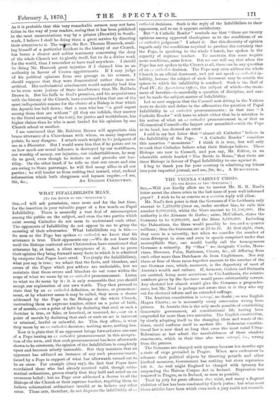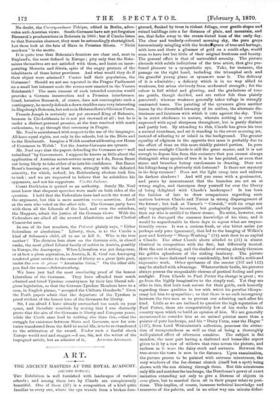THE VIENNA CABINET CRISIS.
[TO THE EDITOR OF THE "SPECTATOR.")
SIR,—Will you kindly allow me to answer Mr. It. It. Noel's letter anent the above crisis in the last issue of your well-informed paper? I wish to be as concise as a seriatim reply will allow.
Mr. Noel's first point is that the Germans of Cis-Leithania only amount to 7,230,000 (later on, under another bias, he calls this number 8,000,000), whilst the Slays amount to 11,556,000. His authority is the Almanac de Gotha ; mine, McCulloch, states the Germans to be 8,200,000, and the Slays 9,810,000. Including the Dalmatians, the Slays would possibly be ten-and-a-quarter millions; thus the Germans arc as 33 to 41. At first sight, then, they seem in a minority, but when we consider the number of races divergent in aims and even in speech comprised under that monosyllable Slav, one would hardly call the homogeneous Germans a minority. By " Slav " we designate Czechs, Mora- vians, Slovenes, Poles, Ruthenes, Croats, &c., all differing from each other more than Dutchmen do from Englishmen. Not any three or four of these races together amount to the number of the one German race, which, moreover, is the depository of most of Austria's wealth and culture. If, however, Galicia and Dalmatia are omitted, being mere accretions to Cis-Leithania, the relative numbers given by the Spectator would prove substantially correct. Any electoral law almost would give the Germans a preponder- ance, but Mr. Noel is perhaps not aware that it is they who cry out for electoral reform and an extended suffrage.
The Austrian constitution is octroye; no doubt ; so was English Magna Charta ; so is necessarily every concessiou wrung from princes. In Austria this is the only mode possible of establishing democratic government, all constitutional life having been suspended for more than two centuries. The English constitution, by slowly adapting itself to the changing ideas and wants of the times, could conform itself to modern life. Bohemian constitu- tional law is now dead so long that even the most rabid Ultra- Bohemians at last admit the unsuitableness of those obsolete enactments, which in their time also were octror; i.e., wrung from the princes.
The Germans are charged with tyranny because ten months ago a state of siege prevailed in Prague. When men endeavour to advance their political objects by throwing petards and other kindred measures, Government has nothing but stern repression left it. As well might England be charged with tyranny for suspending the Habeas Corpus Act in Ireland. Repression was removed in Prague, as in Ireland, as soon as possible.
Trial by jury for press offences does exist, and many a flagrant violation of law has been condoned by Czech juries ; but what must those articles have been which even such a jury could not stomach.
No doubt, the Correspondence Teheque, edited in Berlin, advo- cates anti-Austrian views. South-Germans have not yet forgotten Bismarck's proclamations in Bohemia in 1866; but if Czechs listen to that Borussian charmer, they must be astoundingly shortsighted. Let them look at the fate of Slays in Prussian Silesia. " Nicht mucksen " is the motto.
It is quite true that Bohemia's frontiers are clear and, next to England's, the most defined in Europe ; pity only that the Bohe- mians themselves are not satisfied with them, and insist on incor- porating Moravia and Silesia, spite of the angry protests of the inhabitants of these latter provinces. And what would they do if their object were attained ? Coerce half their population, the Germans? Should we not see repeated in the Prague Parliament on a small but intenser scale the scenes now enacted in the Vienna Reicherath ? The mere rumour of such intended coercion would provoke a German insurrection and a Prussian interference. Good, harmless Bismarck, of course, does not contemplate such a contingency, he merely defends a down-trodden race very interesting in Hapsburg's Bohemia, but not so in Hohenzollern's Silesiaor Posen.
Francis Joseph is certainly not yet crowned King of Bohemia, because in Cis-Leithania he is not yet crowned at all ; but he is under a distinct personal promise, at the time received with much enthusiasm, to go through that ceremony in Prague.
Mr. Noel is misinformed with respect to the use of the languages. All have equal rights, not only in the schools, but in the Diets and in the Reiclisrath. Imagine a Welsh member addressing our House of Commons in Welsh ! Yet the Austro-Germans are tyrants.
Mr. Noel says that the papers defending the Germans are" well subsidized" by Government. I suppose he knows as little about the application of Austrian secret-service money as I do, Baron Beust not being likely to take either of us into his confidence. But Baron Beust's leanings are, or at least were, strongly with the defeated minority, for which, indeed, his Reichenberg electors took him to task ; and we are requested to believe that he subsidizes his opponents, and not his supporters. Credat Jutheus.
Count Diirkheim is quoted as an authority. Surely Mr. Noel must know that eloquent speeches were made on both sides of the question. I hold that the Federalists have had mush the worst of the argument, but this is mere assertion versus assertion. Look at the men who voted on the other side. The German party have with them all the Liberals of the land, and even the outsiders, the Magyars, admit the justice of the German views. With the Federalists are allied all the avowed Absolutists and the Clerical Concordat men.
In one of its last numbers, the Pokorok plainly says, "Either federalism or absolutism." Liberty, then, is to the Czechs a kind of Solomon's child, all to me or kill it. Who is the true mother? The division lists show on the German side, in closed ranks, the most gifted Liberal family of nobles in Austria, possibly in Europe, the Auerspergs. When Liberalism was yet dangerous, or at best a pious aspiration, in Austria, K. K. Graf von Auersperg rendered great service to the cause of liberty as a great lyric poet, under the no»: de plume " Anastasius Grim." On the other side you find the name—Schwarzeuberg.
We have just had the most convincing proof of the honest Liberalism of the Germans. They have offended their much admired and loved Tyrolese countrymen by their late liberal reli- gious legislation, so that the German-Tyrolese Members have to a man, in English phrase, "accepted the Chiltern Hundreds." Even the Pesth papers admit that the departure of the Tyrolese is proof evident of the honest love of the Germans for liberty.
Sir, I am afraid I have already encroached too much on your space, and therefore conclude by stating that I can distinctly prove that the aim of the Germans is liberty and European peace, while the Czech aims lead to nothing else than this,—that the struggle for existence between Slays and Germans, now for cen- turies transferred from the field to social life, is to be re-transferred to the arbitration of the sword. Under such a fearful shock Europe would reel and stagger.—I am, Sir, not the writer of the
impugned article, but an admirer of it, A O&M°. ANG MAX.



































 Previous page
Previous page